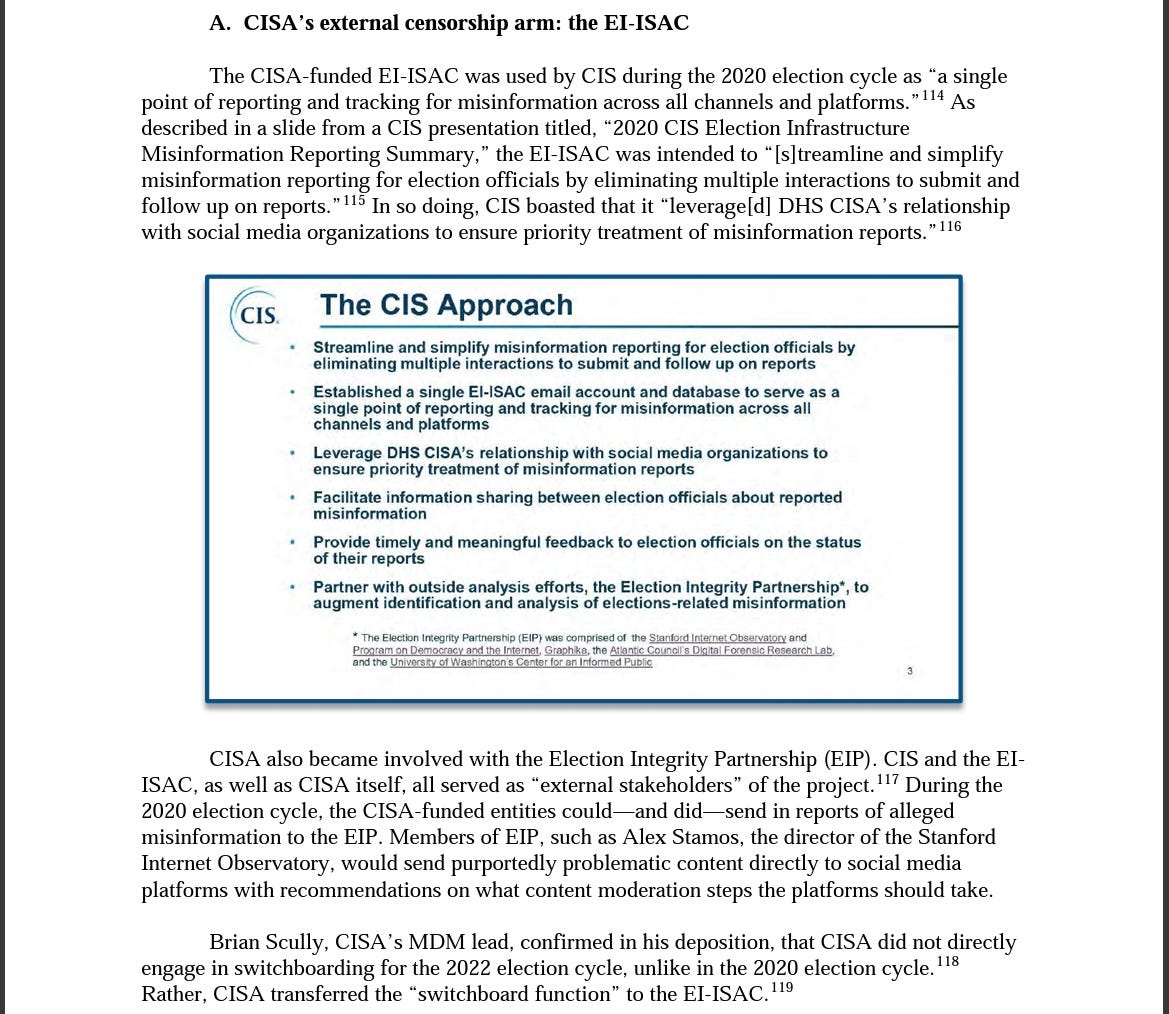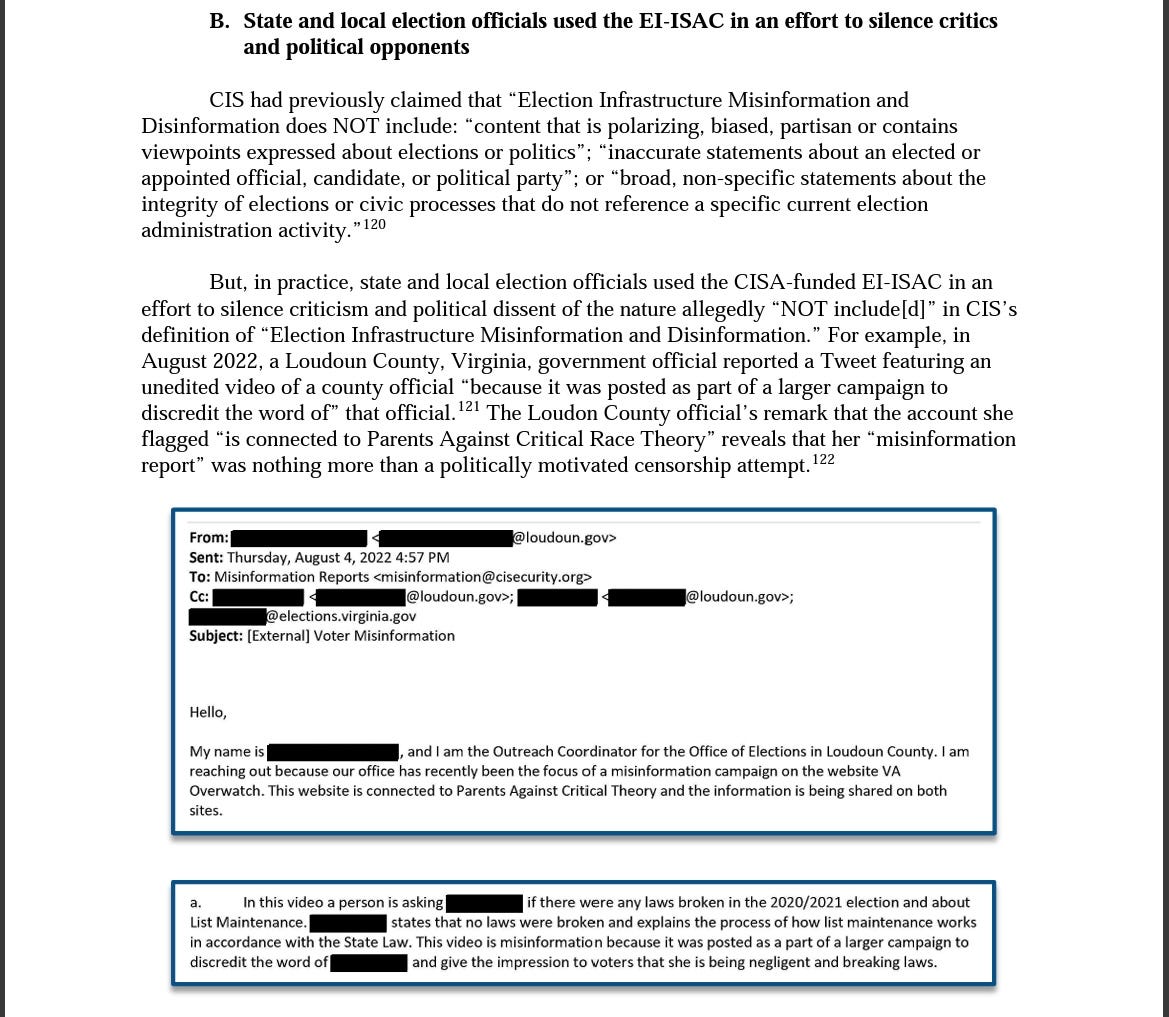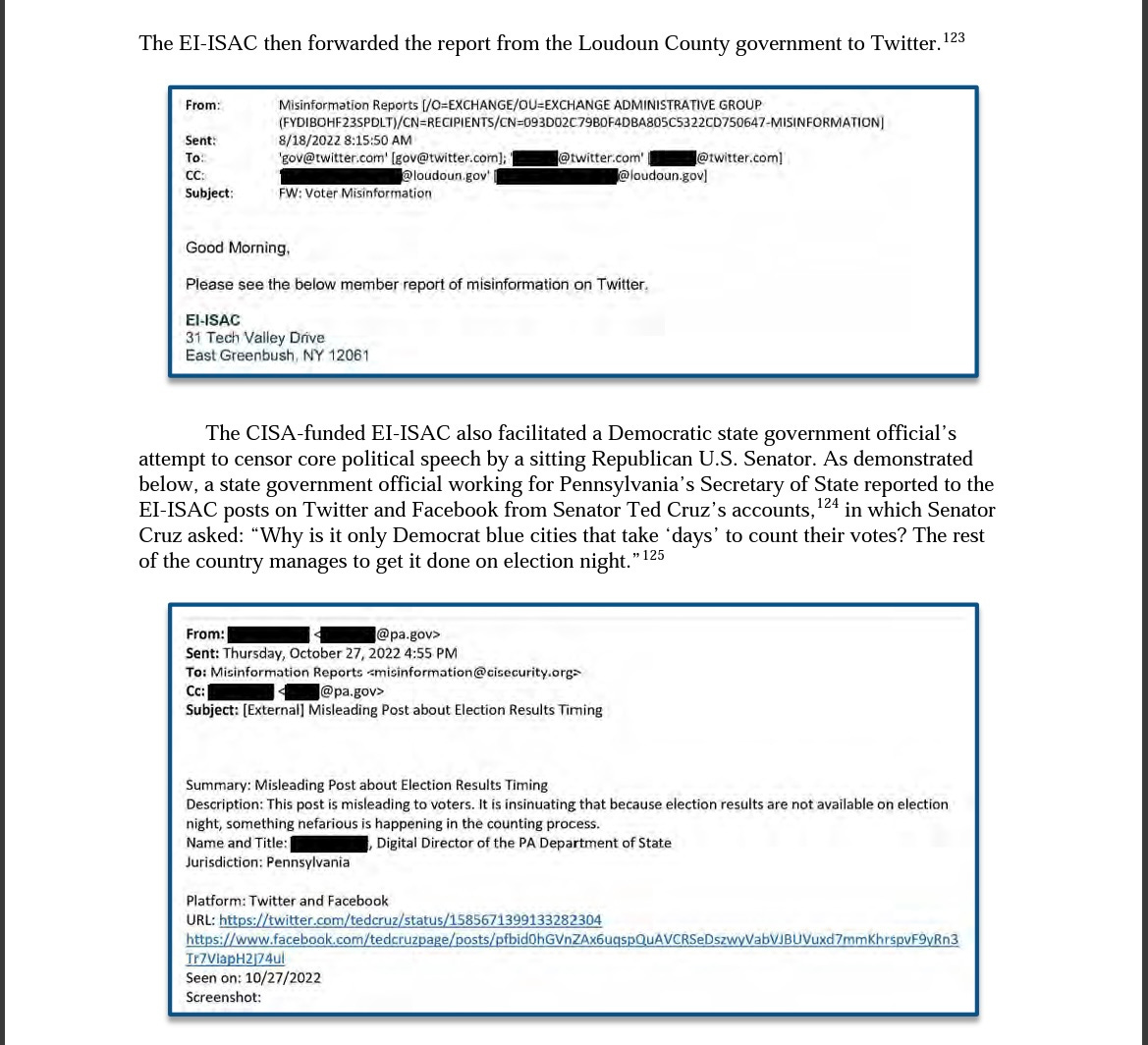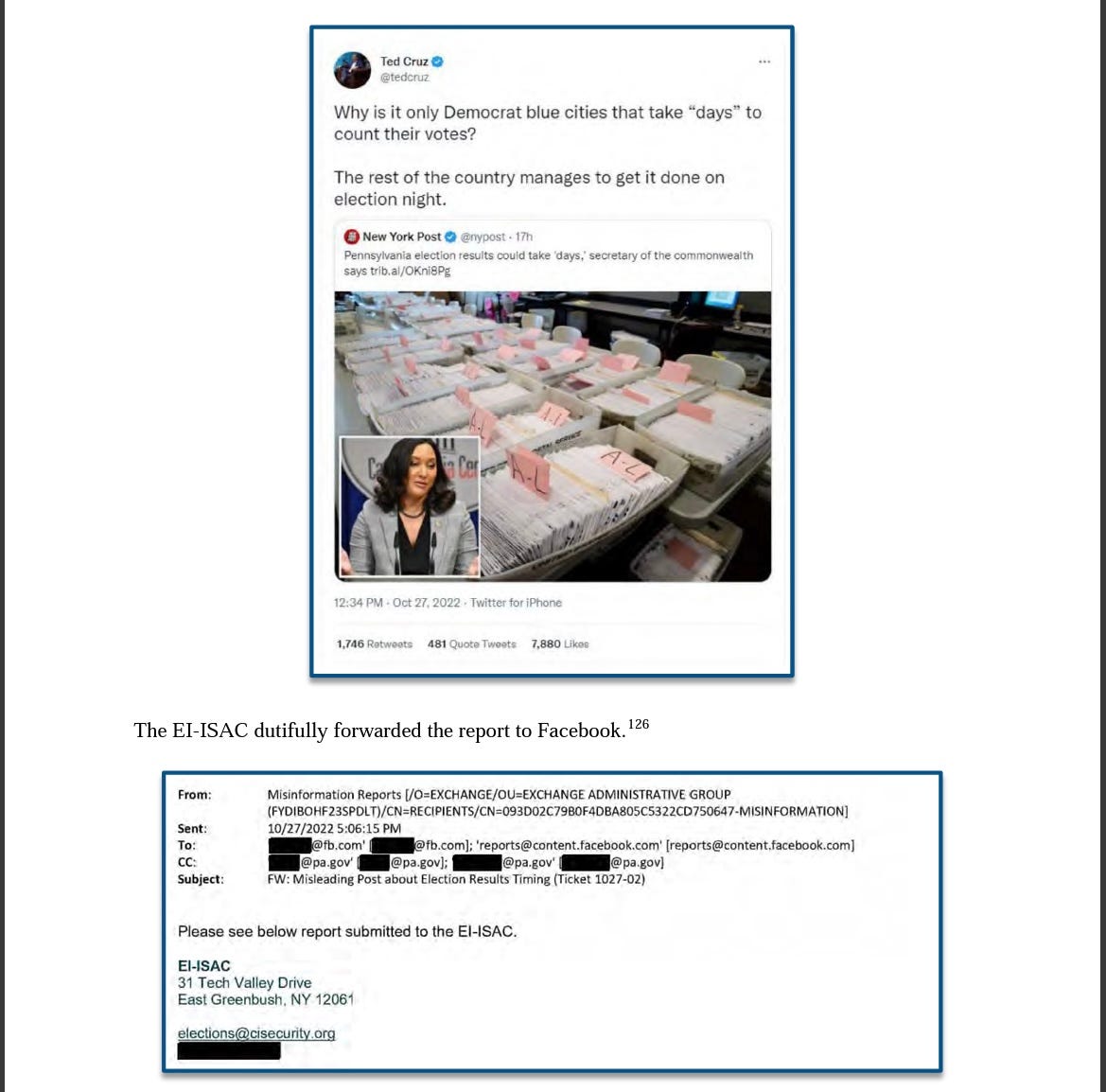The Weaponization of CISA
How a “Cybersecurity” agency colluded with Big Tech and “disinformation” partners to censor Americans
Interim Staff Report of the Committee on the Judiciary and the Select Subcommittee on the Weaponization of the Federal Government U.S. House of Representatives
CISA is "working with federal partners to mature a whole-of-government approach" to curbing alleged misinformation and disinformation.
CISA considered the creation of an anti-misinformation "rapid response team" capable of physically deploying across the United States.
CISA moved its censorship operation to a CISA-funded non-profit after CISA and the Biden Administration were sued in federal court, implicitly admitting that its censorship activities are unconstitutional.
CISA wanted to use the same CISA-funded non-profit as its mouthpiece to "avoid the appearance of government propaganda."
Members of CISA's advisory committee agonized that it was "only a matter of time before someone realizes we exist and starts asking about our work."
CISA’s Cybersecurity Advisory Committee (CSAC)
DHS created the CISA Cybersecurity Advisory Committee (CSAC) in June 2021 "to advance CISA's cybersecurity mission and strengthen the cybersecurity of the United States. "CSAC in turn established a "Protecting Critical Infrastructure from Misinformation & Disinformation" Subcommittee, commonly known as the "MDM Subcommittee.”
The MDM Subcommittee, which has since disbanded, brought together government, Big Tech, and academic misinformation "experts," including:
Dr. Kate Starbird, Associate Professor and Co-Founder of the University of Washington's Center for an Informed Public (CIP). CIP was a member of both the Election Integrity Partnership (EIP) and the Virality Project (VP). Starbird served as the Chair of the MDM Subcommittee.
Vijaya Gadde, the former Chief Legal Officer of Twitter, who was "involved in censoring [the New York] Post's Hunter Biden laptop" story. Gadde was also "behind the decision to permanently ban former President Trump from Twitter." Shortly after Elon Musk completed his purchase of Twitter, Gadde was fired from the company in October 2022.
Suzanne Spaulding, a former assistant general counsel and legal adviser for the Central Intelligence Agency (CIA), who also served as the Under Secretary for the NPPD, CISA's predecessor within DHS. Spaulding is now the "director of the Defending Democratic Institutions project at the Center for Strategic International Studies (CSIS).
MDM Subcommittee meetings also featured government participants, including Geoff Hale, who leads CISA's "Election Security Initiative, and Kim Wyman, the former Washington Secretary of State, who now serves as CISA's Senior Election Security Advisor.
The Center for Internet Security (CIS)
The Center for Internet Security (CIS) is a nonprofit organization that operates the Multi-State Information Sharing and Analysis Center (MS-ISAC) and Elections Infrastructure Information Sharing and Analysis Center (EI-ISAC). According to a postmortem report covering social media activity related to the 2020 election cycle, “the EI-ISAC served as a singular conduit for election officials to report false or misleading information to platforms.” Put plainly, election officials around the country sent CIS purportedly false or misleading content, which CIS forwarded to the relevant social media platforms.
CISA funds CIS, including spending $27 million in FY 2024 on operating the EI-ISAC and the MS-ISAC.
CISA’s Mission Creep Into Surveillance, Censorship, and Cover-ups
The Committee and Select Subcommittee have obtained previously undisclosed, non-public documents that reveal CISA expanded its mission to surveil Americans' speech on social media, colluded with Big Tech and government-funded third parties to censor by proxy, and tried to hide its plainly unconstitutional activities from the public.
Surveillance: CIA expanded its mission from "cybersecurity" to monitor foreign "disinformation" to eventually monitor all "disinformation," including Americans speech. In one e-mail exchange obtained by the Committee and Select Subcommittee, the agency's rapid mission creep surprised even a non-profit focused on foreign "disinformation."
Censorship: CISA exploited its connections with Big Tech and government-funded nonprofits to censor by proxy, in order to circumvent the First Amendment's prohibition against government-induced censorship. This included the creation of reporting "portals" which funneled "misinformation" reports from the government directly to social media platforms. Newly uncovered meeting minutes show that CISA was advised by a group Big Tech executives and academics who encouraged CISA's unconstitutional behavior.
Cover-ups: As CISA's operational scope expanded further into unconstitutional territory, the agency and its advisors tried to cover their tracks and cover up CISA's censorship of domestic speech and surveillance of American citizens' social media activity. This included scrubbing CISA's website of references to domestic "misinformation" and "disinformation."
1. CISA has transformed into a domestic intelligence and speech-police agency, far exceeding its statutory authority.
Switchboarding: CISA's coordination with Big Tech to censor Americans
CISA's MDM consultants rejected constitutional "limitations" on the surveillance and censorship of domestic speech
CISA considered creating an anti-MDM"rapid response team" to physically deploy across the United States
MDM "experts" wanted CISA to crack down on factual information
CISA is only one part of a "whole-of-gov-ernment" approach to MDM
State election officials warned CISA to"remain within [its] operational and mission limits," lest it should earn the public's "distrust"
DHS was eager to cement CISA as a domestic intelligence agency
Social media companies mocked CISA'sMDM team and DHS's Disinformation Governance Board
CSAC members were concerned about the MDM Subcommittee
II. CISA colludes with third parties to circumvent the First Amendment and conduct censorship by proxy
CISA's external censorship arm: the El-ISAC
State and local election officials used the El-ISAC in an effort to silence critics and political opponents
CISA admitted to outsourcing its surveillance operation to third parties
III. CISA has attempted to conceal its unconstitutional activities and remove evidence of wrongdoing
Fearing public pressure and legal risks, CISA outsourced its censorship operation to the EI-ISAC
The MDM Subcommittee tried to disguise its recommendations by removing references to surveillance and censorship
CISA's MDM advisors fretted that it was "only a matter of time before someone realizes we exist and starts asking about our work"
CISA purged its website of references to domestic MDM and its First Amendment violations in response to public pressure
The Biden Justice Department interfered with public records requests in order to shield CISA from public scrutiny of its unconstitutional practices
CONCLUSION
In 2019, CISA's Chief Counsel claimed: "We are not law enforcement and we're not the intelligence community." In theory, the statement is accurate. CISA is not a law enforcement agency and is not authorized to act as an intelligence agency. But, in practice, that is how CISA has behaved, arrogating to itself the authority to conduct surveillance of Americans on social media. CISA expanded its unconstitutional practice by developing an elaborate social media censorship apparatus spanning multiple organizations, in order to facilitate the censorship of Americans' political speech both directly and by proxy. There is no constitutionally viable legal authority that allows CISA to engage in this or any other kind of censorship. Thus, not only does CISA's conduct violate the First Amendment, it also disregards the basic principle of the separation of powers, which prohibits agencies from acting outside of their congressionally delegated sphere.
As Suzanne Spaulding, the former CIA legal advisor and MDM Subcommittee member, presaged, it was *only a matter of time before someone realizes we exist and starts asking about" CISA's repeated violations of the First Amendment. CISA's attempts to cover up its surveillance and censorship operations will not rectify the damage inflicted on the American people by government-induced censorship. Neither CISA's scrubbing of its website, nor the Biden Administration's stalling of records requests can conceal the true nature of CISA's work in "combating MDM."
CISA must be reined in, as must the Biden Administration's "whole-of-government" approach to social media censorship. Every American has the right to express his or her opinion online, and to receive information from others. Government classifications of opinions as "misinformation" or "disinformation" do not nullify the First Amendment's guarantees. A free and democratic society is impossible under a government that acts as the ultimate arbiter of truth in political discourse. To better inform legislative efforts to end government censorship on the Internet and protect Americans rights guaranteed by the First Amendment, the Committee and Select Subcommittee will continue to investigate the extent of CISA's and other Executive Branch agencies' interactions with social media platforms.
Feels good to be back! 👋





















